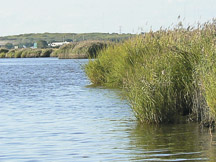This Nov. 3, voters will be faced with only one ballot initiative: Question No 1. The referendum will, if passed, would allow the state to borrow $400 million to fund the Garden State Preservation Trust.
Originally created in 1999 by then-Gov. Christine Todd Whitman, the trust fund is used to preserve open space, save endangered farmland, and to protect wetlands. The trust fund has no permanent funding structure, thus, voters must replenish it every few years through a ballot referendum.
Although voters have supported similar ballot measures to fund the trust in the past, the difficult economic climate could make some voters nervous about such an expenditure now.
If approved, $218 million of the $400 million appropriation will be used to preserve green open space across the state. Another $146 million would be used to preserve New Jersey farms.
“I think I must have the only house in Secaucus that has a Vote Yes on Question No. 1 on its property.” – Bill Sheehan
________
“The money doesn’t just preserve open space; it also preserves our water supply, including our drinking water supply,” said Joe Basralian, conservation advocate for the New Jersey Audubon Society. “Five million people, including quite a few from Hudson County, get their drinking water from the Highlands. There are 19,000 of Highlands acres that have critical preservation needs right now.”
Lonegan against referendum
Former Republican gubernatorial candidate Steve Lonegan has come out against the referendum, arguing that too much of the money goes to projects unrelated to open space preservation, such as Astroturf ball fields. Lonegan also says New Jersey can’t afford to fund the $400 million trust since it would increase the state’s debt.
Lonegan could not be reached for comment last week.
Basralian countered Lonegan’s arguments, stating that only a small percentage of the fund, 5 percent, is used to build Astroturf fields. He also cited a 2007 study by the U.S. Department of Environmental Protection that found a $10 return for every one dollar spent of preservation projects.
Riverkeeper wants more for Hudson, Bergen
But even some local environmentalists find fault with the trust fund’s structure.
“We weren’t really excited about the breakdown [of money],” said Hackensack Riverkeeper Bill Sheehan, whose turf covers Hudson and Bergen counties. Riverkeeper is a national non-profit environmental organization that has a Hackensack River chapter, run by Sheehan.
“They have quite a bit of money for farmland preservation, which doesn’t go to Hudson County and doesn’t go to Bergen County,” added Sheehan, a Secaucus resident. “We wanted to push for more money for urban parks and more money for urban areas.”
Still, money from the trust has benefitted several Hudson County cities and towns. Money from the trust fund, for example, was used to convert old rail yards near Jersey City’s Liberty State park to open space, and was fundamental in the creation of Laurel Hill Park in Secaucus and Braddock Park in North Bergen.
“You know, there are still other reasons to support the referendum,” Sheehan commented. “There’s still Green Acres [state grant] money there that we’d benefit from… I think I must have the only house in Secaucus that has a Vote Yes on Question No. 1 on its property.”
Sheehan agrees with Lonegan that asking voters to borrow money every few years is not ideal.
“Hopefully we’ll come up with a sustainable source of funding, which is what everyone really wants,” he said. ‘We don’ want to have to go back to the voters every couple years to ask for more money. We want to get a sustainable source of money so that these kinds of projects can have a permanent source of funding.”
E-mail E. Assata Wright at awright@hudsonreporter.com.
